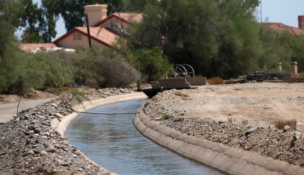Town seeks public relief
Arizona Capitol Reports Staff//June 15, 2007//[read_meter]
The small town of Oatman has a colorful past and lots of visitors. It has 130 residents and 30 businesses. Now it really needs toilets.
Oatman, a former gold mining town in Mohave County, is a popular tourist destination. The town has seen a gold rush, been hit by fire and a shutdown of mining operations. It has benefited from the opening of Route 66 in the 1920s, and suffered when the I-40 freeway bypassed it in the 1950s. By the 1960s, it had become a ghost town.
In the 1970s it became a tourist spot when neighboring Laughlin, Nev. boomed as a gaming town and Route 66 became popular as a historic highway. Visitors poured in, and the town again managed to hang on.
It has its charms. Burros roam free on the town’s streets. They can be hand-fed. For those who want a glimpse of what the early 1900s were like, folks stage daily Western-style gunfights. Then there’s the famous Oatman Hotel, built in 1902 and visited by Clark Gable and Carole Lombard in 1939. They spent their wedding night there.
Even though business in town is thriving, it is facing a problem. No public toilets.
One politician summed up the immediacy of the situation when he remarked, “I have been to Oatman and at my age, bathrooms are important and I vote ‘aye’.”
The speaker was Sen. Robert Burns, R-9. The event was a Senate committee hearing in March, and Burns’ “yes” vote was for H2698, a proposal to form a sanitary district for the purpose of building public toilets in Oatman.
Yet while no one disputes the town’s need for public restrooms, the problem is complicated by its geography, its testy relations with the county and its senator who has consistently fought against the creation of new taxing districts, and then some.
Bill soon went down the drain
The bill, sponsored by Rep. Nancy McLain, R-3, hurdled one House panel and two Senate committees. The House passed it by a vote of 47-10 on March 6.
Then it got flushed in the Senate on May 10.
The senator who vigorously opposed it was Sen. Ron Gould, R-3, who represents the town’s residents in the Senate.
In fact H2698, until that point, seemed headed to the Governor’s Office. Senators had given the bill preliminary approval on a division vote of 12-11 during a committee of the whole session.
But Gould, after reminding colleagues that the bill would create a new taxing district, managed to convince senators to support his motion amending the committee of the whole report to state that the bill failed. His motion carried by a vote of 15-10.
McLain missed Gould’s maneuver and only found out a day or two later that her bill had, in fact, sunk.
“I was not aware that there was some way that it could be recalled for a second vote,” she told the Arizona Capitol Times.
McLain said she was disappointed for the folks of Oatman. Their hearts were set on seeing the bill sail through.
McLain is trying to revive the bill. Senate President Tim Bee said he spoke with her recently about the possibility of reconsidering the measure, which would require a suspension of Senate rules.
Bill goes against GOP pledge
In a nutshell, the bill allows the formation of a sanitary district and the collection of an excise tax, which would increase the current sales tax of 5.75 percent to 7.75 percent, subject to the approval of voters. This would serve as a revenue stream, which then can help secure a loan. A local chamber of commerce official said they already have a property where they could build the public facilities.
Opposition to the bill centered on an ideological aversion to creating new taxing districts. Gould’s opposition is rooted in a pledge, taken by many Republicans at local and national levels, not to support any hike in taxes.
Another critic, Sen. Robert Blendu, R-12, was concerned over bonding. Blendu does not want to create a situation where the state assumes responsibility for paying off bad loans, should a taxing district fail to meet its obligations. McLain had said she could amend the bill to stipulate that the district would not do bonding.
Lawmakers had other questions. Why can’t the town simply raise the money on its own? How many toilets are needed so that a “toilet district” can be created? And, are there no historical groups or non-profit organizations that could be approached for help?
One Mojave County supervisor is also against the creation of the sanitary district. Buster Johnson of District 3 told lawmakers he does not think that an emergency exists. He believes the idea of funding the building of toilets through the levying of additional sales tax is not well thought out. He said he is concerned with giving people taxing authority without oversight.
Other complications
The town has one other problem, he said. It needs a sewage system, and a public toilet built by a sanitary district needs to be hooked to a sewage plant. In the case of Oatman, the nearest plant is many miles away, and rights of way would have to be obtained to hook the toilets to the plant. The town’s geographical makeup complicates matters: Oatman’s crisscrossing mine shafts pose a challenge to the building of a septic system.
In fact, the town’s folks could not agree on a solution to the sewage problem, according to Johnson.
The town was using a building — which also served as the town library — with public restrooms for about a decade. But the town lost use of the facility last year. It seems the agreement between the landowner and the county was rescinded and the building was handed back to the owner.
“There is a need for public restrooms and they need it because businesses do not allow the public to use their facilities,” Johnson said.
He has another question: Assuming that a sanitation district is created, would it produce a revenue stream that is stable enough to pay for a loan?
“I did not come here to merely state my objections,” he told lawmakers in committee. “I want you to know that Mohave County has a serious schedule for an area plan. The plan would bring all the parties together to solve not only the problem of public restrooms but many concerns in the area.”
McLain said she believes the revenue would be enough, citing the additional sales tax of 2 percent that the bill would allow to be collected, assuming the people vote to create the district and vote to impose the tax. The total tax would also be at par or a bit less than Bullhead City’s, she said.
Jackie Rowland, an official of the Oatman Chamber of Commerce, told lawmakers during committee hearings that they had done everything to raise private funds to build the facilities. They received a cash donation from the Mojave Indian tribe. Today, donation jars sit beside many cash registers in town, asking visitors to chip in money for the toilets.
Unfortunately, their combined efforts have fallen short in raising the estimated $40,000 initially needed to build the public restrooms, according to Rowland. Annexation may solve the toilet question, but the town has too few residents to meet incorporation requirements. Also, McLain said its property values are not that high to qualify as sufficient collateral. The grants available are matching grants — meaning they would have to raise a counterpart fund, which brings them back to their fundamental difficulty — the community cannot, on its own, raise sufficient money.
The town does have portable toilets. They pass a hat to pay for their maintenance. Oatman has a few restaurants that have also restrooms, and while they all help, they simply are not enough to accommodate hundreds of thousands of visitors a year.
There is an ugly downside to portable toilets — they are far from being ideal in the heat.
Tourists have complained, a chamber official said.
It remains to be seen whether the H2698 can be revived. The legislative session is winding down and now leaders are focusing on passing a final budget.
To revive the bill, the Senate needs to suspend Rule 13-A, which limits a motion to reconsider to the same session or the next succeeding session. The motion needs a majority vote to be carried.
McLain said this was Oatman’s “last resort” to solve its toilet woes.
“Come on up to see us,” Rowland urged lawmakers early this year. But without restrooms, how many legislators would take up Rowland’s invitation?
















